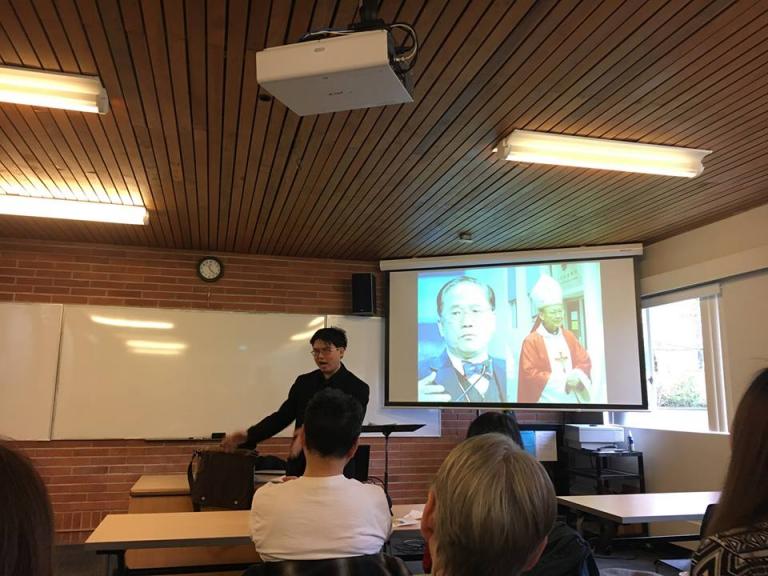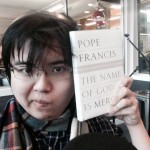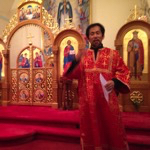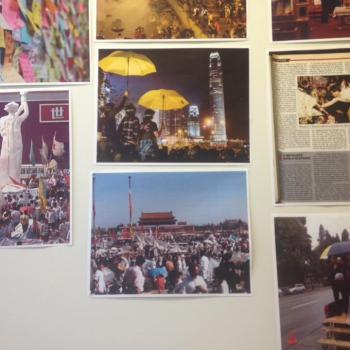
Sam Rocha gave me three years to narrate myself on this blog, and I made the mistake of taking him literally at first. It is now the opening of my third year in blogging on Patheos, and I think I have a better handle on what this task of narration is about. Over the past week, I have logged my recapitulation of all of what I understood myself to be doing on the blog. I thought that the genre was confessional. It is, up to a point. But as I neared the end of my reflections, I discovered that that is not all that it is. Instead, I came to see that it is a narration of my sense of the moral, the theological, and the political.
Aristotle may be the best entry point into this discussion, but perhaps Confucius is too. In any case, it doesn’t matter which philosopher is the entry point; the point is in fact to enter into the universality – indeed, the catholicity – of this conversation. But I have been thinking a lot about what Aristotle seems to be saying about the moral, the theological, and the political, and if the genre of the blog is to write in a way that narrates my most tentative thoughts, then my limited Aristotelian thinking is just as good as any other entry point for thinking through these concepts.
What I have come to see on the blog is the way that the arenas of morality, theology, and politics are related in my own life. The moral refers to the way that I as a person am integrated into the way that the order of things as the world actually exists and is created to be. The purview of morality involves concepts like chastity, which is the practice of moral integration that relates to sexuality at its most intimate point but is part of the discipline of everyday life more generally, and the pathway toward moral formation requires what the mothers and fathers of the church, including my patron saint Holy Justin the Philosopher and Martyr, refer to as askesis, the bodily training such that persons master the passions instead of having them master the person.
Passions, in other words, are signs of disintegration. They are colonizing forces on the psyche. I now understand that my work on psychoanalysis and anti-colonial liberation theology is therefore related to the moral insofar as the educational acts of conscientization reveal those points of psychic colonization. In this way, I came to the conclusion that the practices of settler colonialism, the acts of eradicating and replacing indigenous peoples on lands that are to be exploited in a purely natural way (and therefore in ways that are inattentive to their status as divine creation), are immoral. I also came to see that the management of one’s house – the practice of economia – is a moral task because it is about integration. The confessional part of the blog has involved revealing the areas of my life that still suffer from forms of disintegration from the passions as I struggle with the ascetic discipline required to live a morally integrated and chaste life. The point of living a moral life is to be as free a person as I can be, liberated from the colonizing passions and therefore able to engage in the world in a clear, direct, and wise way.
The theological is an encounter with the supernatural that constitutes the way things are. In Christian theology, it leads to a personal friendship with Jesus Christ. There are also other spirits that even the apostles acknowledge that are part of the world, what the Holy Apostle Paul calls the elemental spirits. The spiritual crowdedness of the arena of the theological suggests that the task of theology is a complex one, as theology is the attempt to articulate in words these points of primal meeting.
Theology should not be confused with ideology, which is its perversion. To be ideological is to attempt to manipulate the cosmos, which is theologically constituted, toward an imaginary future that one pictures to be a kind of utopian paradise. Oftentimes, ideologies are beautiful: poverty is eliminated, injustices are righted, evil people are punished, and peace is established. Many Christians and their secular derivatives confuse the two concepts – the ideological and the theological – simply thinking that their articulation of a beautiful society will lead to its fulfillment. In this way, theology often becomes an avenue through which the spiritual is manipulated. Such idolatry, in which the theological order becomes but a mirror for one’s own fantasies, is probably more dangerous than simply acknowledging that Jesus Christ is Lord and that the elemental spirits also exist. Indeed, it is immoral because it disintegrates the fantasizing person from the actual theological order.
An example of this confusion between the theological and the ideological on my own blog is the term the private consensus is unraveling. Identifying what I called the private consensus to be the source of a kind of knot in the world, I overdetermined the way that current events were playing out such that it had to lead to its unraveling. I even idolized the Bishop of Rome, Francis, as well as his ecclesial colleagues in other Christian communions who came to power around 2013 as figures that demonstrated that the private consensus had to be unraveling and that a new society built on the messiness of the commons would be established. In so doing, I substituted my own theological encounter of the risen Lord with the supernatural discernment of others, and so I was not doing theology anymore. A theology that is truly Catholic is one where one’s encounter with Jesus Christ does not happen alone, but is part of the universal experience of the supernatural that is common to the diverse peoples who call themselves the people of God. There may be different words that those groups use to attempt to articulate their experience, but we are really just trying to grope toward putting into speech that which, as Holy John the Theologian puts it, was from the origin, what we have heard, what we have seen with our eyes, what we have gazed upon and our hands have touched concerning the Logos of Life (1 John 1:1, Hart translation).
Blogging as a way of narrating myself has brought me back to the point of being able to do theology. Doing theology is related to morality because it is in the ascetic disciplines that one pushes oneself to encounter the Lord directly instead of through cheap substitutes. This does not mean that that encounter is not mediated. I am, after all, Catholic and embedded in a Cantonese culture. In this way, the words that I use for the theological constitution of the world are often Cantonese, and I am happy to acknowledge that there is something about the martial hero tradition and its focus on familial righteousness and the integrity of a spiritual order that is foundational to the natural world (which means that it is populated with spirits) that is fully compatible with Christian theology. After all, treating the spiritual world with integrity negates idolatry, which is the attempt to pervert and manipulate that world for one’s own ends. There is an order, we Cantonese would say, that is founded in righteousness and justice, and as a Christian, I am happy to have found its fulfillment in the Lord Jesus Christ.
Oftentimes, the encounters that might be described as theological occur during what is called liturgy. The liturgical refers to the actions of a people as they build their homes around the mystery of the divine. Participating in liturgy is a theological act because it is through those actions that I encounter Jesus Christ directly. Mediation and directness are not a zero sum game when it comes to theology, then. The G-d who is reveals himself through his created order, and that is why moral integration is important for the task of theological encounter.
The people’s task in building that common home together can be described as political. Politics refers to that which concerns the polis, which is the commons in which we pool together our households and our moral lives to make a society that we can live in together. The deliberative arena of that society may be called a civil society, but I prefer the Greek – the koinonia ton politon. Indeed, my translation of Aristotle’s Politics just translates that term as political community. Where there are people, there are politics, my mother used to tell me. She meant it as a lament, as the political always involves a kind of antagonism among people as they duke out how they want to organize that society. However, as I integrate politics with the moral and the theological, I find that I celebrate the term because what it means to do politics as a Christian is to organize around the mystery of the G-d who has revealed himself in the created order with which we must be integrated.
That organization places front and centre the person as a political agent, endowed with dignity as an icon of that God who has been revealed in Jesus Christ. In my academic work, I therefore take great joy in writing about the messiness of groups such as Cantonese Protestants, occupy movements, and indigenous peoples that might participate in the civil societies of the Pacific Rim (my region of focus) in contesting ways. That they are messy reveals that they are doing the heavy lifting of politics, which is the fulfillment of what it means to be a fully morally integrated person. My emphasis on theological integration also suggests that the civil societies in which I am interested may be entering a postsecular phase, a period where the norms of secularism that prescribe that the theological be kept private (that is, that religious communities are ipso facto given to a private consensus) are being questioned, challenged, opened up, and debated.
Postsecular politics, in other words, brings theology into a public arena, heightening the stakes of getting the difference between the theological and the ideological right. Postsecularism makes everything messier, because it does not even foreclose the question of what the secular is. Instead, it opens up the various forms of secularity to open and public scrutiny, and in this sense, the unraveling of this particular form of the private consensus is not ideological because it means that people get to talk about and even fight over how to articulate their theological encounters as part of what it means to organize a society. This kind of politics is very exciting, but it is also dangerous because the spiritual is fire, and playing with fire can enflame the passions too. A postsecular civil society also therefore raises the bar for moral formation. The problem, of course, is that in many cases, the two have not gone together, which is why postsecularity can result in complete chaos too.
My celebration of politics and their attendant messiness positions me against the post-political, which is an attempt to shortchange the messy deliberations of the political with the bureaucratic efficiency of policies imposed on everyday life. A post-political impulse is often born of seeing the messiness of politics and wanting to come to a solution to overcome it. Its problem is that such impulses also tend to institutionalize the passions. After all, it places an institutional bureaucracy and hierarchy in charge of the mess of the world.
An example of the post-political in this sense may be the mistake of Francis’s pontificate as things stand in emphasizing the agency of bishops’ conferences over against the people of God. The result has been a sex abuse crisis in the Latin Church worse than the ones that came before, and one can find similar examples within evangelical institutions, the Orthodox churches, the secular academy, athletic teams, artistic collectives, and activist communities. At least the mess of politics reveals where those passions might be so that they can be rooted out through the integration of chastity. In this way, the political, as I conceptualize it, can be described as inherently oriented toward a kind of democracy at least in the sense of recognizing the political agency of each person by virtue of their propensity to encounter phenomena that might be described as theological and the imperative for them to integrate with the moral order instead of living in a masturbatory fantasy world of disintegration and delusion. As a result, my own politics tend toward the support of radical democratic movements, such as occupy movements, over against authoritarian governmentalities, the term that Michel Foucault used to describe the way that government logics become rooted in the psyche so that persons in the political arena discipline each other toward obedience to the government instead of acting in freedom to build a society born from their encounter with the deepest dimensions of their own existence.
Narrating my own conception of the relation among the moral, the theological, and the political has given me a much deeper appreciation of what the word publics means. A public, in the singular sense of the word, is what scholars like Jürgen Habermas, Michael Warner, Lauren Berlant, and Nancy Fraser refer to as an audience for a specific discussion. Publics are usually mediated, and therefore they also refer to the network of circulation among those receiving those transmissions. Broadly speaking, those networks might be called the media, the avenues for public communications that reach intended publics. This blog is an example of such an avenue, designed to reach a public – or in my case, since I often do not always know who is reading it, the public in the sense of a kind of vast unknown. Academia seldom rewards such public excursions because it is beholden to its own sense of quality control known as the peer-review system. Despite the propensities of peer review to be post-political, I have also found it a challenging political space and have enjoyed my encounters there. However, I also blog quite extensively because my work is on publics, and the analysis of what one does not know firsthand will be shallow. It is sort of like the difference between the theological and the ideological: in ideology, one may present the workings of a theological vision, but the political, at least in the postsecular sense, depends on an actual theology, which is a direct encounter with the supernatural and the struggle to articulate it. Likewise, blogging and my social media engagements are my feeble attempts to engage directly with the publics that I study in the hope of understanding the politics that I would not have been able to experience otherwise.
Publics are supposed to be channels by which the political is communicated, but more often than not, they are avenues for post-political propaganda as well. The key to writing about publics is to be open to whatever ways they may be constituted. The mistake that I made with the private consensus is unraveling was to overdetermine publics as the pathway to liberation from the post-political. This overdetermination was what resulted in that formulation being an ideology that I was committed to propagating. While I am still against the post-political nature of the private consensus – which is my description for the culture derived from an overexuberance about what some have called the victory of the liberal international order at what the political scientist Francis Fukuyama misleadingly called the ‘end of history’ (pace Kojève and Hegel) and its exaltation of a market capitalist system as the apex of human existence – I am a bit more nervous about declaring the triumph of politics over against the post-political in public arenas, including postsecular ones. Perhaps it is unraveling in some places and tightening in others. The discipline of intellectual chastity here is to forego my own fantasies of what I wish would happen and to describe what is actually happening whether I like it or not.
The place where I work out my thinking about postsecular publics, and therefore the everyday work through which I struggle for moral integration born out of my liturgical encounters with the theological in the church where I worship Jesus Christ, is an area of the world known as the Pacific Rim. The Pacific Rim is an instantiation of the liberal international order in which the market economies of the Asia-Pacific and the Americas are said to be integrating, leading to migration movements that have changed the cultures of the civil societies in them and have arguably led them to this postsecular moment. As a scholar in Asian American studies, I engage the Pacific Rim with a particular politics, which is that the people, not the systems, should be primary in the analysis.
In other words, the Pacific Rim is often described in post-political terms, in terms of institutional networks of markets, states, publics, and other such apparatuses. I am interested in it, however, from the political perspectives of the people who have to live in its societies. My study of Cantonese-speaking Protestants is thus not simply the result of me having grown up in their midst and then having daddy and mommy issues with them as I have joined the Greek-Catholic Church of Kyiv. It is rather that through an examination of their politics, the inconsistent underbelly of this larger post-political apparatus can be revealed. In the same way, it is not just that the work on Cantonese Protestants led naturally to my interest in the Umbrella Movement in Hong Kong for purely selfish reasons. Instead, the leaderless nature of an occupy protest and its aftermath, which I compare between Hong Kong and Seattle so that both sides of the Pacific are represented, is another example of a political challenge to post-political norms, as well as a kind of democratic depression when politics becomes foreclosed by government bureaucracies. Finally, that they both invoke a kind of indigeneity leads me to think about the actual indigenous peoples who are also organizing in this region and their relationship to the apparatuses, economies, and migration movements on the Pacific Rim. They too are not absent from the story, and in a third project, I hope to be able to tell their story.
This is the work that I bring to the liturgies of my church, then. Instead of making an ethnic Ukrainian out of me, the Greek-Catholic Church of Kyiv has brought me to an encounter with Jesus Christ just as I am. In this theological way, this church is my mother, and in the work that she enables me to do in the academy and in my own household management, she facilitates my continuing integration of the moral, the theological, and the political. What this also means is that as far as my past is concerned as an Asian American evangelical Protestant who reached the apex of that spiritual identity in the Anglican Communion, I no longer have any stake in reforming those social institutions, though I still write about both as far as they touch on my interests in postsecular Pacific publics, the moral and theological constitution of the political in those arenas, and the ideologies of the post-political that are present there as well.
To have been able to struggle in my articulation of the messiness of this integrative process on this blog has been an honour and a privilege. I am thankful to Sam for asking me to narrate myself here. It has taken two years for me to transcend the genre of hysteric confession and to move explicitly into the scholarly work that makes public the integration of the moral, the theological, and the political in my own life. I am now as ready as I can be for the third year.
















